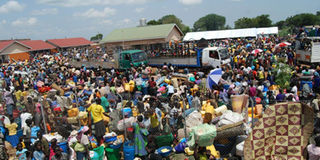Locals sell land to refugees for survival

Arrival. Hundred of South Sudanese refugees arrive at Elegu Reception Centre in Amuru District in July last year. PHOTO BY JULUIS OCUNGI
What you need to know:
- Other areas. In July last year, local leaders in Amuru District wanted to close Elegu Refugee Reception centre, protesting OPM’s failure to establish a Refugee Settlement in the district.
- The South Sudan crisis started in 2013, when forces loyal to President Salva Kiir and former vice president Riek Machar, had misunderstanding thus resulting in fighting.
Amuru. Amuru District residents are losing much of their land to refugees who fled from war in South Sudan.
Several of the refugees who asked to be hosted by their relatives have secretly bought big chucks of land without the involvement of the district and local government authorities and are transacting directly with the land owners.
The continuous loss of land has been attributed to the biting poverty faced by the people of Amuru, whose only hope is to sell their only valuable assets, land inclusive.
The refugees have bought land in the sub-counties of Pabbo and Atiak, all in Amuru District, part of which has been turned into grazing zones for their animals.
The district chairperson, Mr Micheal Lakony, says the government is to blame for the development since they turned down an offer by the locals, who had availed land for their official settlement.
“Refugees are owning land without the knowledge of the district leaders. This may cause insecurity in the long run,” Mr Lakony warns.
In 2016, residents offered 12 square kilometres for the establishment of refugee settlement centres specifically to accommodate South Sudan refugees escaping war.
Refused camps
This was at the backdrop of refusal by the South Sudan refugees to settle in camps upon reaching Elegu Reception Centre in Atiak Sub-county, arguing that they were to stay in their relatives’ homes.
The Office of the Prime Minister (OPM) that oversees the settlement of the refugees in the country insisted that they had enough land at the time to accommodate the refugees and did not require the intervention of the district.
“We shall still get back to OPM and inform them about the dangers of staying with unregistered refugees in the communities so that they are relocated to the suitable settlement centres,” he said.
Apart from acquiring land illegally, refugees have benefited from the inadequate social services meant for the population, according to Mr Lakony.
“The resources which were only budgeted for the locals are now being shared with the refugees,” he says.
The district estimates to have a total of 2,000 South Sudan refugees.
The LCV councillor for Atiak Subcounty, Mr John Bosco Ocan, accuses government leaders of transacting land deals between locals and refugees.
He accuses some refugees of having sneaked into the country with illegal firearms. He appeals to the locals to desist from selling off their land to the refugees.
Major Telesphor Turyamumanya, the Fourth Division spokesperson, warns refugees about the said transactions asserting that they are supposed to restrict themselves to official gazetted zones.
“Those selling land to the refugees are making a mistake. The law is clear that whoever is seeking help from another country should be settled in a gazetted place,” he says, asking residents to report incidents of insecurities caused by the refugees.
One of the locals in Atiak Sub-county, Mr Kalifan Ongom Celestin, says: “I have not sold out my land. I decided to lease it out for a period of eight years and if the refugees are still here after that time, we shall negotiate a way forward.”
Mr Peter Ongom, 62, says leaders should not accuse them falsely since they also want to make ends meet.
He adds that some of them still have school going children and they need money to facilitate their education.
In July last year, local leaders in Amuru District wanted to close Elegu Refugee Reception centre, protesting OPM’s failure to establish a Refugee Settlement in the district.
The South Sudan crisis started in 2013, when forces loyal to President Salva Kiir and former vice president Riek Machar, developed misunderstanding resulting in fighting.
According to the refugee desk officer in the Office of the Prime Minister, Mr Titus Jogo, refugees have no right to own land but can utilise that provided in the gazetted settlement centres.
“There is need to have massive sensitisation so that the locals desist from selling land to the refugees. It’s wrong the policy of the country is not allowing it,” he said.




